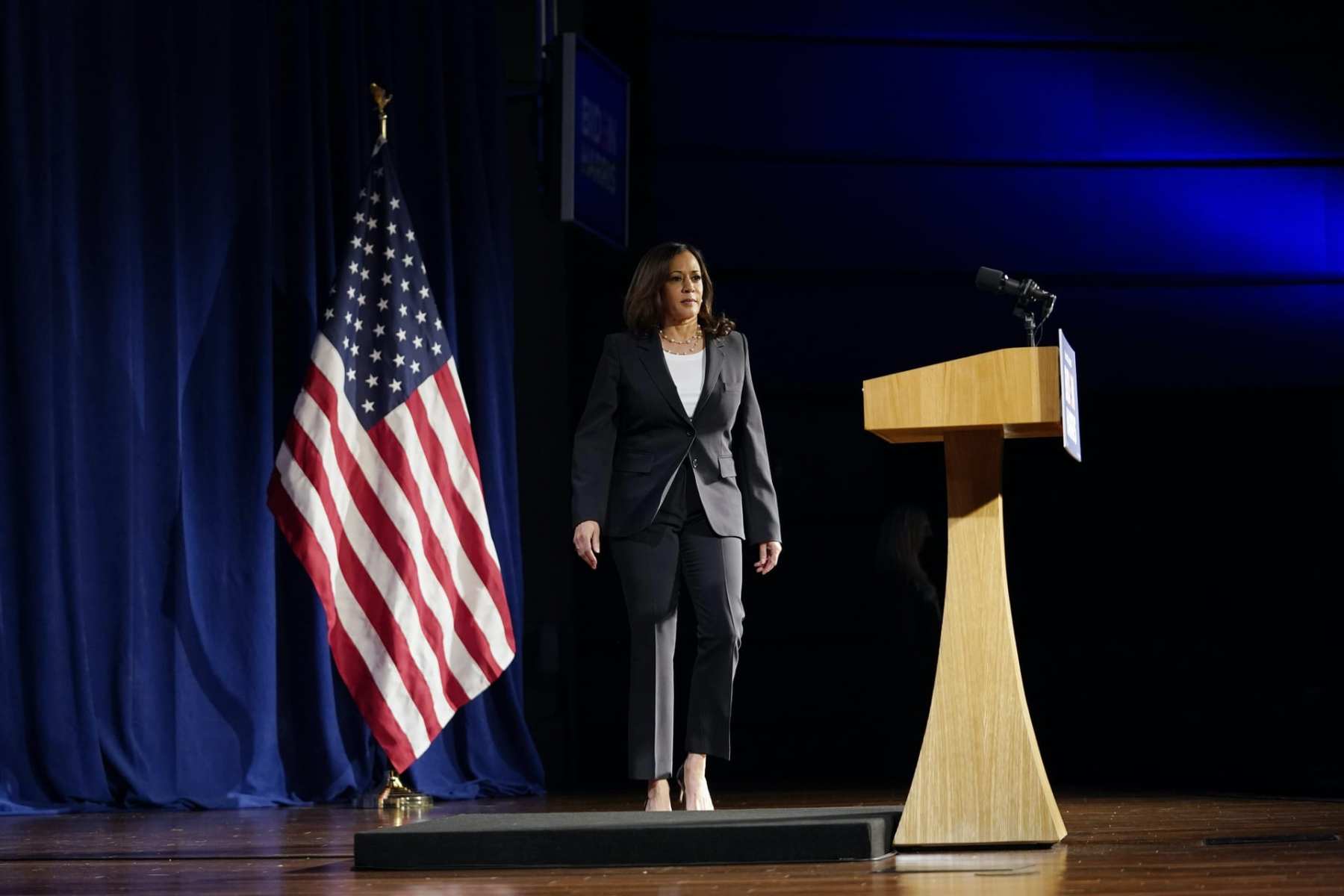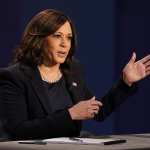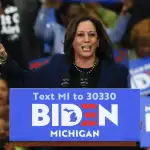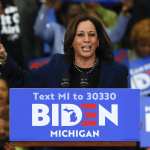When Sen. Kamala Harris steps onto the debate stage Wednesday night, voters will see something they’ve never seen before: a woman of color as a major party candidate representing the general election presidential ticket.
Throughout Harris’ pioneering political career, she has navigated a gauntlet of race and gender to ascend to the highest elected office ever held by a Black woman. As the lone Black woman currently serving as a United States senator, she has won praise and drawn scorn as a member of the Judiciary Committee for her high-profile exchanges with White men in power and seeking power.
Last summer, as a candidate for president, it was Harris who introduced the issue of race onto the debate stage, challenging then-frontrunner and her eventual partner on the 2020 Democratic ticket, Joe Biden, on his record on school desegregation and busing.
Observers say her past experiences as a prosecutor, as a senator and running for presidential office have all forged Harris into a candidate ready to meet her moment and make the case for the Biden-Harris ticket in the home stretch of a consequential and chaotic election. With many voters focused on the dual pandemics of coronavirus and systemic racism, she is expected to draw a sharp contrast with Vice President Mike Pence, who served as head of the president’s Coronavirus Task Force.
“For any woman of color, when you reach this level of ascendancy in whatever field, you don’t get there without having gone into the lion’s den and come up against the power structure which is, by and large, White and male,” said Democratic strategist Leah Daughtry. “Going into spaces where we are not expected, where we are diminished, where we are underestimated, we do that every day. We are constantly in a state of proving ourselves. She’s done this before.”
New Jersey Sen. Cory Booker, a friend, fellow competitor on the 2020 Democratic campaign trail and one of only three Black senators, said Wednesday that Harris has been overcoming racism and sexism for her entire career.
“When it comes to what people might be heaping upon her, saying about her, there is nothing that this Black woman hasn’t faced in terms of racism, bigotry and sexism before and overcome it to an extraordinary degree,” Booker said.
“Watching her under attack … seeing her being challenged left and right, she has this powerful way of making it about the mission and not the person,” Booker continued. “She will be up there tonight keeping the focus on the American people, their lives, their challenges. There’s so many Americans that will find her story compelling and something they can relate to.”
The 90-minute debate — moderated by USA Today Washington Bureau Chief Susan Page and being held at the University of Utah in Salt Lake City — is expected to be less raucous than last week’s first presidential debate of the general election, which was short on policy or plans to address the pandemic and heavy on personality and ego.
“She will talk about how to handle the COVID pandemic and how to unify the country around systemic racism,” Democratic strategist Karen Finney said of Harris. “That’s what Americans are looking for right now. The debate last week was just a train wreck.”
The role of the vice president has taken on outsized importance this cycle, as whichever candidate gets the job will have to confront the economic and public health crises caused by the pandemic. And with two presidential candidates in their late seventies — including President Donald Trump, who is among the more than 7.5 million Americans who have contracted COVID-19, and both men in the vulnerable age group of people disproportionately dying of the disease — the health and ages of the vice presidential candidates (Harris is 55 and Pence is 61) is also a consideration.
Valerie Jarrett, former senior adviser to President Barack Obama, said Harris will bring passion, optimism and authenticity to the stage.
“No matter what party you’re affiliated with, this is an opportunity to listen,” said Jarrett, part of the “We Have Her Back” campaign aimed at pushing back against negative gendered narratives aimed at Harris.
“Anybody who gets in the way of that will not be well-received by the public,” Jarrett continued. “I hope Vice President Pence does not attempt to do to her what President Trump attempted to do to Vice President Biden,” she said, referring to the president’s dozens of interruptions of Biden and moderator Chris Wallce. “Let her finish her thought.”
The “We Have Her Back” campaign released a report this week analyzing media coverage of the 2020 vice presidential nomination process and found that a quarter of media coverage of Harris included racist and sexist tropes. Trump has referred to Harris as “nasty” and “mean” and has mispronounced her first name at his campaign rallies.
Earlier this year, Harris returned to the Senate after dropping out of the Democractic presidential primary and has pushed for legislation addressing the inequalities exposed in the pandemic, including calling for racial data around COVID-19 cases and deaths; legislation addressing housing and food insecurity; protections for pregnant people; and voter access in the pandemic.
Since becoming Biden’s running mate in August, Harris has echoed his message calling for the need to address racial injustice and mirroring his precautions in the pandemic, including masking and social distancing on the campaign trail. On the debate stage, at Harris’ request, the candidates will be separated by a clear, plastic barrier and will sit 12 feet apart — twice the distance between the presidential candidates last week.
Both Harris and Pence tested negative for COVID-19 on Tuesday. Pence had reportedly opposed the barrier being on stage, a physical reminder of the pandemic, though he eventually dropped his objections.
The debate commission did not release the debate topics in advance as they did for the first presidential debate, but the pandemic is expected to dominate the conversation. More than 210,000 Americans have died from COVID-19 this year.
Campaign aides said Harris will focus on framing the Trump administration’s response to the pandemic as part of a pattern of failure over the past four years. Harris will not be fact-checking Pence if he makes untrue statements, but she could bring attention to such remarks, aides said.
The vice presidential candidates’ contrasting styles will also be on display.
Pence, a former talk radio show host with an even demeanor, is not expected to be the bombastic scene-stealer of the night, as the president was last week. Still, he will likely stick to the campaign’s talking points, which could include misinformation.
“Tonight we do expect Mike Pence to have a good debate,” said Symone Sanders, a senior adviser to the Biden-Harris campaign. “We’re not coming in underestimating him. Sen. Harris will be speaking directly to voters at home, not questioning Mike Pence. We expect Vice President Pence to attack Sen. Harris and try to sow division within the Democratic Party.”
Harris, a former prosecutor, has a methodical style that, on the debate stage, has also highlighted her personality. But in confirmation hearings as a senator, Harris has been withering against adversaries like former Attorney General Jeff Sessions, current Attorney General Bill Barr and Supreme Court Justice Brett Kavanaugh.
“She doesn’t have to go out and land a knockout punch against Mike Pence,” said Democratic strategist Bakari Sellers, a Harris surrogate during her 2020 campaign who was among those advising her headed into Wednesday night.
Sellers said that while Pence is “extremely talented” and not to be underestimated, any attempt to “otherize” Harris will fall flat.
“The senator knows that she has to go out and prove that she can be president of the United States,” Sellers said. “She’s joyful, honest and has faith in what this country can be, and she’s going to show that [at the debate].”
Daughtry added that Harris’s lived experience and command of the realities of the pandemic could give her an advantage Pence lacks.
“That helps her to discuss the issues with an incisiveness and with an accuracy that Mike Pence’s experience does not give him,” Daughtry said. “Mike Pence is the one who is the amateur here.”
With less than four weeks to go until Election Day and millions of Americans already casting ballots in states by mail or in-person across the country, both campaigns are seeking to generate excitement and enthusiasm headed into the home stretch. A historic night could galvanize Black women in particular, regarded as the vanguard of the Democratic Party and seen as crucial to a Biden-Harris victory.
“This is an opportunity for Kamala Harris to speak for herself, to speak for the campaign and to speak clearly to Americans about why the choice couldn’t be clearer between Joe Biden and Donald Trump,” said The Collective PAC co-founder Stefanie Brown James. “Part of the pressure on Kamala Harris’ shoulders is that she carries the culture of so many different communities. At the same time, she has to be the embodiment of a person who is championing policies that will advance all Americans.”
As the lone Black and South Asian American woman in the 2020 Democratic presidential primary, Harris’ identities were unfamiliar to some voters, and she failed to gain traction. But her race and gender have been in the spotlight as a running mate, as Harris has met in smaller groups with Black men and women voters in battleground states in cities including Milwaukee, Detroit and Philadelphia.
A pair of Biden-Harris campaign ads released ahead of the debate and airing in battleground states focus on Black voters. One features Harris on the trail, masked and meeting with voters and talking about the ticket’s planned pandemic response if elected; the other shows a young, Black girl excited about Harris’ candidacy.
“The fact that, for the first time ever in the history of this country, there will be a Black woman, and Indian woman, a woman of immigrant parents on the stage as a vice presidential nominee is incredible,” said James. “It represents so many voices that have never been heard before at that level. We cannot take moments when history is being made for granted.”






